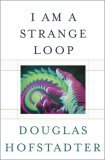Currently reading: “I Am a Strange Loop” by Doug Hofstadter
May 27, 2007
 I am almost finished reading this book and just want to note a few points that have struck me along the way.
I am almost finished reading this book and just want to note a few points that have struck me along the way.
First, if there are any awards for back-of-the book indexing, Hofstadter should get one! In keeping with the book’s theme, the index includes a reference to itself: “index, ordeal of making a good, 374.” The index also features a wonderful extensive list of “analogies, serious examples of” – such as “between brain and oil refinery” or “between edibility and provability” or “between Leafpilishness and Consciousness.”
The wordplay is quite lively throughout; one of my favorite examples is the use of the term “freewilly-nilly” in a discussion of free will (“we move willy-nilly but not freewilly-nilly.”) Hofstadter accepts that we have will but not that it is free will.
My interest in the book really started to pick up at Ch. 13, where issues of the self and consciousness begin to come to the fore. Leading up to that there is a lot about levels of analysis, Gödel, and the idea of the strange loop.
Hofstadter equates the self with consciousness and develops the idea that “every normal adult human soul is housed in many brains at varying degrees of fidelity and therefore every human consciousness or “I” lives at once in a collection of different brains, to different extents.” (p 259) Personal identity is not coextensive with the physical body but has a “blurriness” enabling low-resolution instantiations of a self to appear in other minds.
In Ch. 21 Hofstadter discusses Derek Parfit’s Reasons and Persons and finds Parfit’s views to be compatible with his own.
A video called “Victim of the Brain,” based on Hofstadter’s earlier work, is available from Google Video.
Wikipedia has entries for strange loop and for the book I Am a Strange Loop, though the latter is just a stub at this time.


